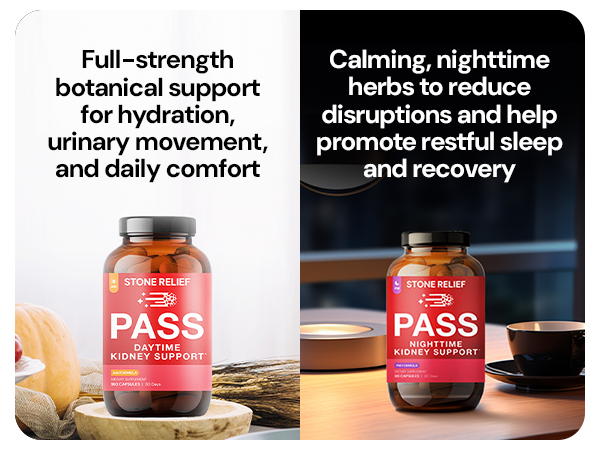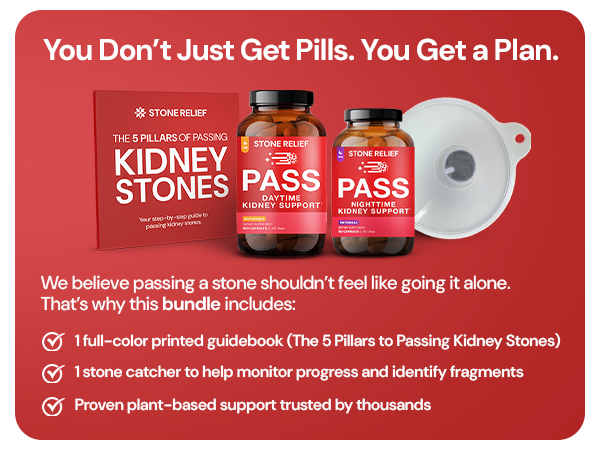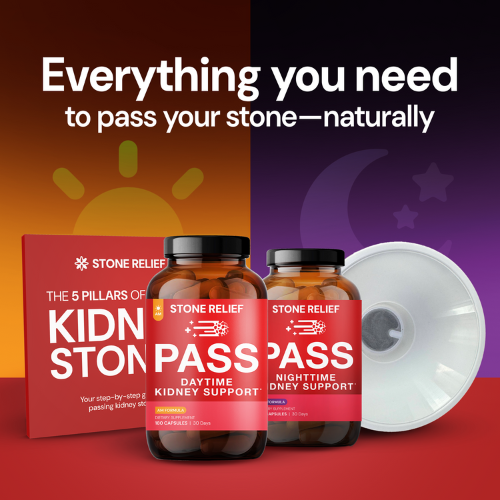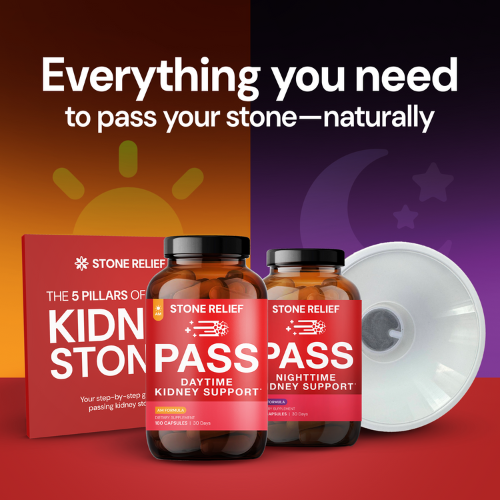How Sjogren Syndrome Triggers Kidney Stones
Sjogren syndrome is an autoimmune condition that not only attacks moisture-producing glands but also disrupts kidney function. This disruption leads to alkaline urine, low citrate levels, and high urinary calcium—conditions that promote calcium phosphate kidney stones. Understanding how this process works can help you take back control.
Key Takeaways
-
Sjogren syndrome leads to alkaline urine, a known trigger for calcium phosphate stones
-
It can also cause low urinary citrate, reducing natural protection against stones
-
High urinary calcium is common due to bone demineralization from acid load
-
The underlying problem is often distal renal tubular acidosis (dRTA), a pH imbalance linked to Sjogren’s
If you’ve been struggling with recurring calcium phosphate kidney stones, there’s a chance that an autoimmune condition called Sjogren syndrome may be at the root of it.
While Sjogren’s is most commonly associated with symptoms like dry mouth, itchy eyes, and fatigue, it also impacts the kidneys in ways that trigger kidney stones—especially the calcium phosphate type.
Let’s dive into what Sjogren syndrome is, how it affects your kidneys, and what you can do to reduce your stone risk.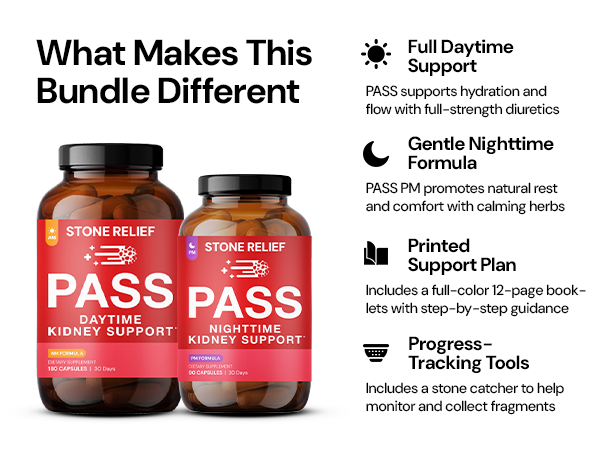
🛒 Check Price & Purchase Stone Relief Pass AM/PM Bundle on Amazon
What Is Sjogren Syndrome?
Sjogren syndrome is an autoimmune disease, which means the body’s own immune system mistakenly attacks healthy tissues.
In the case of Sjogren’s, the glands responsible for moisture and mucus production are the primary targets. This leads to:
-
Dry eyes
-
Dry mouth
-
Fatigue
-
Joint pain
There are two forms of Sjogren syndrome:
-
Primary Sjogren’s occurs alone, without other autoimmune issues
-
Secondary Sjogren’s is linked to other autoimmune diseases like lupus, rheumatoid arthritis, or scleroderma
While the exact cause is unknown, one theory supported by many in the kidney stone community is that diet plays a critical role—both in triggering and potentially reversing autoimmune disorders like this one.
People in carnivore and animal-based diet communities have reported dramatic improvements—and in some cases, complete remission—of Sjogren syndrome symptoms, though this is not part of mainstream medical advice.
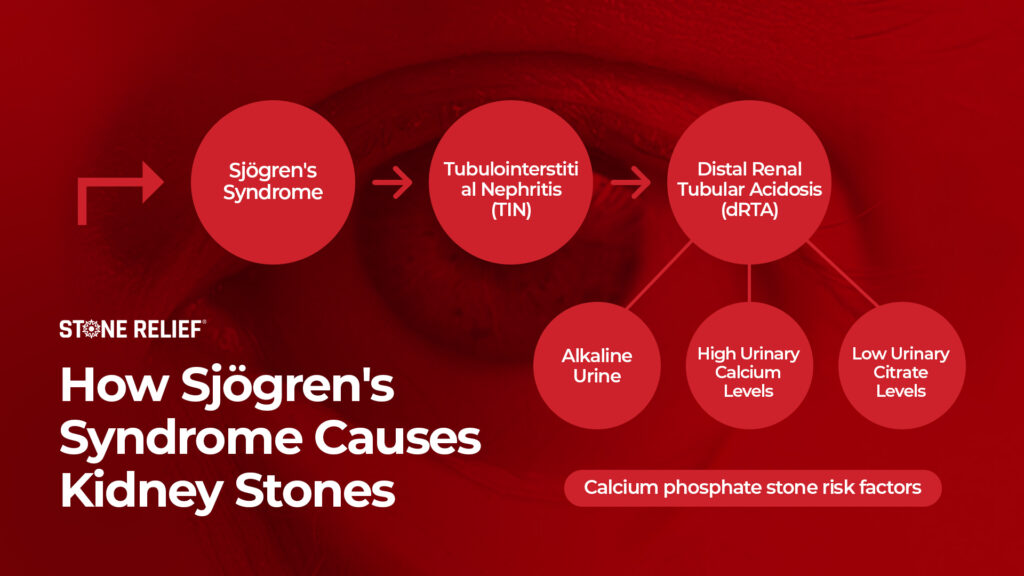
How Sjogren’s Causes Kidney Stones
Roughly 14–20% of people with Sjogren syndrome form kidney stones. That’s a significant number—especially when you realize the global average for kidney stones hovers around 10–12%.
Here’s how Sjogren’s increases your risk for calcium phosphate stones.
1. Alkaline Urine
People with Sjogren’s tend to have alkaline urine—a pH above 7.5—which is the perfect environment for calcium phosphate stones to form.
The chain reaction that causes this looks like this:
-
Sjogren’s causes tubular interstitial nephritis (TIN), which inflames the kidney’s filtering units
-
TIN leads to distal renal tubular acidosis (dRTA), a condition where the kidney fails to properly excrete acid (hydrogen ions)
-
This failure causes acid to build up in the body, dropping blood pH while urine pH rises, becoming more alkaline
Why does this matter?
Because alkaline urine encourages calcium to bind with phosphate, instead of being excreted harmlessly. That’s how stones start to form.
2. Low Urinary Citrate
Citrate is your natural defense against calcium-based stones.
It binds to free calcium in the urine, preventing it from sticking to phosphate (or oxalate) and forming stones.
But Sjogren’s disrupts this protection.
Here’s how:
-
With dRTA, the body becomes more acidic
-
To buffer this acid, the body reabsorbs urinary citrate for use elsewhere
-
This leaves less citrate in the urine, reducing protection and increasing stone risk
So if you have Sjogren’s, you may be fighting stones without your body’s natural shield.
3. Increased Urinary Calcium
Doctors often see high levels of calcium in the urine of Sjogren’s patients. This makes sense when you trace it back to acid load and dRTA again.
When your body becomes more acidic, two things happen:
-
You absorb more calcium from the food you eat
-
Your body pulls calcium from your bones to help balance the acid
That excess calcium ends up in your urine, where it’s free to bind with phosphate—especially in alkaline urine.
The result? Calcium phosphate kidney stones.
🛒 Check Price & Purchase Stone Relief Pass AM/PM Bundle on Amazon
Why Diet Matters More Than You Think
Mainstream medicine often ignores diet as a root cause of autoimmune disorders. But in functional medicine and online health communities, there’s a growing number of people seeing real change through carnivore and animal-based diets.
These diets:
-
Remove inflammatory plant compounds
-
Normalize urine pH
-
Reduce dietary inputs that contribute to stone formation
When Sjogren syndrome is driven into remission, distal renal tubular acidosis can also improve, reducing the cascade of pH imbalances and stone triggers.
So What Can You Do If You Have Sjogren’s and Kidney Stones?
If this condition is contributing to your kidney stones, here’s where to start:
-
Test your urine pH regularly. If it’s consistently over 7.0, you’re at higher risk.
-
Adopt a kidney-friendly diet—especially one that helps neutralize urine pH
-
Increase your hydration to keep your kidneys flushing stone-forming elements
-
Track symptoms and flare-ups—joint pain, fatigue, dry mouth—and note how they coincide with diet or hydration shifts
-
Consider working with a health professional who understands autoimmune disease and kidney stone interaction
🛒 Check Price & Purchase Stone Relief Pass AM/PM Bundle on Amazon
Final Thoughts: You Can Take Back Control
Sjogren syndrome can feel like a mystery—and adding kidney stones into the mix can feel overwhelming.
But now you know the mechanisms behind why it happens, and more importantly, you know what you can do.
You don’t have to accept chronic pain, frequent stones, or the confusion that comes with an autoimmune diagnosis. With the right knowledge, testing, and daily choices, you can take control.

